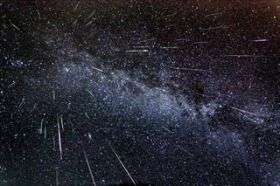Perseid Meteor Shower To Peak Aug. 12

The annual Perseid meteor shower will be visible in the night sky throughout Colorado and will peak during the early morning hours of Aug. 12, according to an astronomy expert at the University of Colorado at Boulder.
Coloradans can expect a "pretty good" meteor show this year because the moon is not full and it will set shortly after midnight Aug. 10-13, leaving a dark sky during the peak nights for meteor viewing, according to Doug Duncan, director of CU-Boulder's Fiske Planetarium.
"Having the moon set creates a darker sky, which makes a big difference in how many meteors you see," said Duncan.
People can expect to see 50 or more meteors, or shooting stars, per hour from dark mountain or plains locations, while in cities and suburbs viewers can expect to see a few meteors per hour, according to Duncan.
Meteor showers occur when the Earth crosses the path of a comet orbiting the sun, in this case Comet Swift-Tuttle. When the comet gets close to the sun parts of the comet melt and break off, creating millions of chunks of ice and dust that make up its tail. These chunks, many as small as a grain of rice, burn up in the Earth's atmosphere making streaks of light called shooting stars.
"Meteorites are fascinating because they give us a sample of space further out than astronauts have been able to go," said Duncan. "Every meteorite ever studied dates back to the very beginning of the solar system, 4.5 billion years ago."
The Perseid meteor shower is named for the Perseus constellation from which the meteors appear to radiate.
Provided by University of Colorado





















